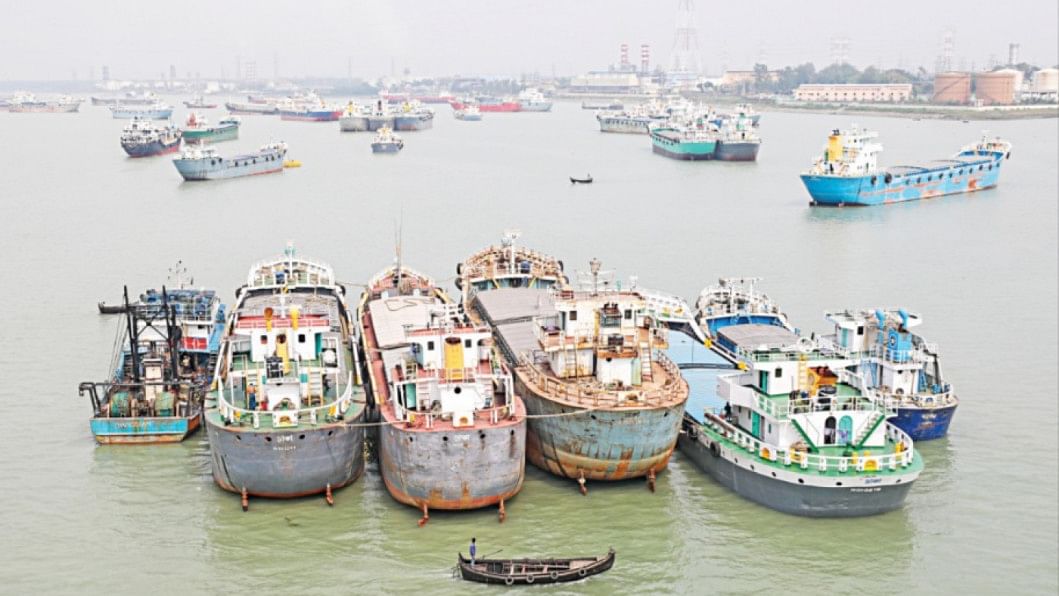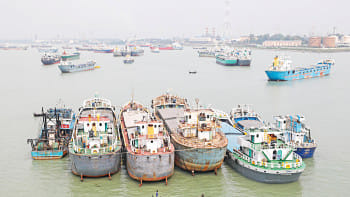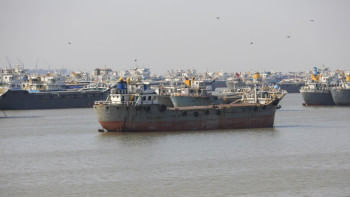Newly formed BWTCC starts allocating serials of lighter vessels

The newly formed private platform, the Bangladesh Water Transport Coordination Cell (BWTCC), began operations today by reintroducing a single serial system for allocating lighter vessels to transport imported cargo through inland water routes.
With this, three conflicting organisations of lighter vessel owners made reconciliation following dispute, split and operating separately for over around 11 months and started to operate combinedly again.
The newly formed cell also announced a new freight chart by reducing it by 4 to 5 per cent from the previous rates for vessels plying from Chattogram port's outer anchorage to over 37 destinations across the country.
Commodore Mohammad Maksud Alam, director general of the Department of Shipping (DoS), inaugurated the vessel berthing meeting activity of the cell through a ceremony held at the BWTCC office at Agrabad Commercial Area in the port city today noon.
Alam expressed hope that discipline would be restored in cargo transport from mother vessels at the Chattogram port's outer anchorage through inland waterways by adhering to the single serial system and vessel allocations managed by the coordination cell.
He said lighter vessels need to transport goods under a serial system in order to make the shipping sector safe, fair and orderly like other transport sectors.
Leaders of three vessel owners' organisations were present at the ceremony.
According to the new chart, the base freight for transporting cargo from Chattogram port's outer anchorage to Dhaka, Narayanganj and adjoining destinations has been fixed at Tk 550 per tonne, up from the previous base freight of Tk 574 a tonne.
The base freight is applicable for transporting cargo like clinker, raw material for cement industry.
An additional freight charge is usually applied on top of the base rate for transporting goods like food grains—such as wheat, lentils, commodities, and fertiliser—as these are shipped in small quantities per vessel, BWTCC Convener Sayeed Ahmad told The Daily Star.
Sayeed noted that extra freight rates have also been reduced by over 25 percent. For example, the extra freight for carrying wheat is now set at Tk 60 per tonne, down from the previous rate of Tk 79, a 24 percent reduction.
Earlier, on October 15, the Shipping Ministry issued a notification introducing a new policy by the Department of Shipping (DoS) for cargo transport by lighter vessels on inland waterways.
The policy mandates that the newly established BWTCC will exclusively manage the scheduling, allocation of lighter vessels, and setting of freight rates.
According to the policy, no lighter vessel, except those owned by factories and industrial groups, will be permitted to transport cargo without an allocation from the BWTCC.
In 2004, three organisations—the Bangladesh Cargo Vessel Owners Association (BCVOA), the Inland Vessel Owners Association of Chattogram (IVOAC), and the Coastal Ship Owners Association of Bangladesh (COAB)—jointly formed the Water Transport Cell (WTC) to coordinate lighter vessels for transporting import cargo.
However, a leadership dispute over control of the WTC and trade persisted for several years between BCVOA and IVOAC.
As a result, on December 19 last year, IVOAC leaders split from the WTC and began operating vessels independently.

 For all latest news, follow The Daily Star's Google News channel.
For all latest news, follow The Daily Star's Google News channel. 





Comments